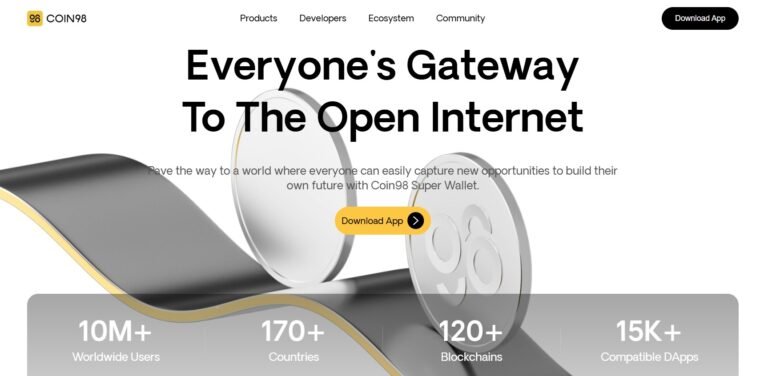Table of Contents
Introduction to Coin98
This article presents a detailed Coin98 review that explores the cryptocurrency coin Coin98 (C98), a multi-chain DeFi platform known for bridging various blockchains and offering users diverse financial services. Registered in Singapore, Coin98 claims to provide decentralized finance solutions such as cross-chain swaps, staking, and lending.
Despite its growing community and ecosystem, questions linger: is Coin98 a scam or a legitimate project with real utility? This Coin98 review highlights key aspects, helping you decide if it’s a trustworthy investment or something to be cautious about.
This review targets two audiences: those who suspect or have been affected negatively by Coin98 and seek honest information, and prospective investors researching before committing funds. We acknowledge the frustration and skepticism that arise from dealing with complex crypto projects, and this article addresses those concerns carefully.
Coin98: Regulation & Legal Status
Coin98 operates in the decentralized finance space and is based in Singapore, a country known for relatively progressive crypto regulations. However, like many crypto tokens, Coin98 itself is not regulated by financial authorities such as the FCA, ASIC, or CySEC. This lack of formal oversight means users bear significant risks, including no official client protection or dispute resolution avenues.
Often, projects imply or suggest affiliations with top-tier regulators without clear evidence. Such tactics can mislead inexperienced investors. Learn how to spot a scam broker before it’s too late. The absence of regulatory approval raises serious questions about whether Coin98 is a scam or simply an underregulated token within the volatile DeFi market.
Trading Conditions & Platform Analysis of Coin98
Coin98 is not a traditional broker but a utility token used within the Coin98 ecosystem. The platform supports multiple blockchains, allowing cross-chain swaps, liquidity mining, and yield farming. However, details on minimum investment amounts, transaction fees, and platform security audits are sometimes vague or hard to verify.
Unlike regulated brokers offering MT4 or MT5 platforms, Coin98’s utility depends on blockchain smart contracts and decentralized apps (dApps). There is limited transparency about liquidity providers or independent security audits publicly available. These factors can introduce risk for users unfamiliar with DeFi complexities. What to check before signing up with a trading platform.
Such missing information and promises of high returns through yield farming create doubts, making it harder to dismiss the idea that Coin98 might be a fraud or at least a high-risk speculative asset.
Reputation & User Reviews About Coin98
Coin98 enjoys an active community on social media and crypto forums. However, reviews are mixed. While many users praise its innovative multi-chain features and growing ecosystem, some report issues with wallet integrations, withdrawal delays, or difficulties understanding the complex platform mechanics.
Verified review sites like TrustPilot show limited feedback, and some testimonials appear overly promotional or lack verification. Traffic analysis from SimilarWeb indicates moderate site engagement, but the platform has yet to reach mainstream adoption.
How to Test Whether Coin98 Is a Scam
To evaluate if Coin98 is a scam, start by verifying any claimed licenses or registrations with recognized authorities such as FCA, ASIC, or CySEC—though most DeFi tokens operate without such licenses.
Look closely for red flags such as vague or missing licensing information and unrealistic promises of guaranteed profits with no risk. Real user reviews on platforms like TrustPilot or Forex Peace Army can provide insight into common complaints or issues.
Assess the quality and security of the Coin98 website and dApps—poor design or frequent technical issues may signal problems. Review withdrawal policies carefully; crypto-only payments or hidden fees can be suspicious.
Finally, try interacting with the platform using minimal funds or test environments, if available. Legitimate projects usually offer ways to experiment without risking significant capital.
Final Verdict & Alternatives
Coin98 offers a compelling multi-chain DeFi solution with innovative features, yet its lack of formal regulation, limited transparency, and mixed user feedback make it a risky option for conservative investors. While it may not be a direct scam, the numerous red flags suggest caution.
If you seek safer alternatives, consider regulated crypto platforms and tokens with clear licensing, independent audits, and established reputations. Prioritizing these factors helps protect your investment from fraud and unnecessary risks.
Ultimately, only invest what you can afford to lose and conduct thorough research before engaging with high-risk DeFi tokens like Coin98.



